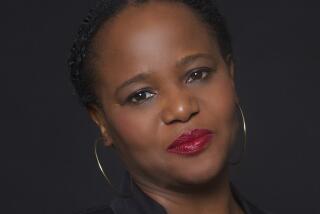The Essays That Assay the Art of Writing
It’s hard to read a David Lodge novel without learning something. Not just something about life, which is what any good novel is supposed to provide; no, Lodge’s novels teach you something that would be useful to know in an English graduate seminar, such as the genericconventions of the modern novel or the basics of Saussurean linguistics.
That’s because his characters, like Lodge himself, tend to be English professors, and English professors--or, at least, dwellers in academe--make up his natural audience. After all, how many bestselling novelists have written books with such titles as “Working With Structuralism”?
It’s disappointing, then, to pick up a book of essays by Lodge in which those discursive, academic elements are given center stage, and find it as miscellaneous and generally unexciting as “The Practice of Writing.”
After all, here’s a writer whose novels often seem to conceal essays. But this volume, composed largely of previously presented lectures and previously published book reviews, seldom gives us Lodge at his most intellectually engaged.
He’s at his best when he’s translating an academic topic for a general audience. As a novelist and critic of the novel, he is uniquely well equipped to write about “The Novelist Today: Still at the Crossroads?”--the first piece in the collection, a neat survey of fiction since World War II and takes an incisive look at the economics and culture of publishing today.
Building on an essay he wrote 20 years ago, Lodge comes up with four categories that make some sense of the bewildering variety of novels written in the last few decades: “fabulation”--clearly nonrealistic or even absurd fiction, like that of John Barth or Salman Rushdie; “empirical narrative,” such as the “nonfiction” fiction of Truman Capote and Norman Mailer (i.e., “In Cold Blood,” “The Executioner’s Song”--imaginative versions of true stories) or the travel writing of Bruce Chatwin; “metafiction” or the “problematic novel,” in which the novelist’s difficulties in choosing a style are incorporated into the novel itself, as in Doris Lessing’s “The Golden Notebook”; and traditional realistic narrative, a surprisingly vigorous school even today, which includes writers as diverse as Kazuo Ishiguro, Margaret Atwood and, of course, Lodge himself.
This scheme is presented concisely and clearly--though the emphasis is on British fiction more than American--and it really can help the reader make sense of the flood of fiction published every year.
Less interesting, on the whole, are the essays on individual writers--Graham Greene, Anthony Burgess and D.H. Lawrence, among others. Lodge is both a “traditional realist” and a Catholic novelist, so he naturally names writers like Greene and Burgess among his important influences. But his treatments of them here do not do justice to that attachment; in fact, what we get are just reprints of Lodge’s reviews of recent biographies of these writers, combined with a few personal reminiscences.
The last third of “The Practice of Writing” is dominated by a series of personal reflections on Lodge’s work in other media: his TV adaptations of “Martin Chuzzlewit,” his novel “Nice Work” and his stage play “The Writing Game.” These essays don’t add anything to the discussion of genres in “Novel, Screenplay, Stage Play,” instead becoming long, rather tedious descriptions of the inner workings of the BBC and the Birmingham Rep.
They also seem to provide an opportunity for Lodge to settle old scores, as he records (in a gentlemanly way, of course) dissatisfaction with various writers and directors. These pieces are of little conceivable interest to anyone who hasn’t read or seen the works being discussed and seem uncomfortably like testaments to Lodge’s vanity.
As an introduction to Lodge, “The Practice of Writing” is certainly not ideal; to get a sense of this author’s clever, erudite voice, it would be much better to check out one of his classic novels, “Changing Places” or “Small World.” Much of what’s said here about Lodge’s influences and about the postwar novel was said better, and with more feeling, in his 1986 book of essays, “Write On.”
Lodge is always a perfectly genial companion--the pleasant, intelligent tone, always so present in his novels, is the main charm of the collection. But only three or four of the items in “The Practice of Writing” seem really necessary, in the sense that they express some original or eye-opening truth about “the practice of writing.” The rest are usually elegant, sometimes curious, but almost never absorbing.
More to Read
Sign up for our Book Club newsletter
Get the latest news, events and more from the Los Angeles Times Book Club, and help us get L.A. reading and talking.
You may occasionally receive promotional content from the Los Angeles Times.








